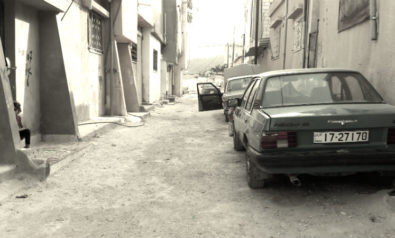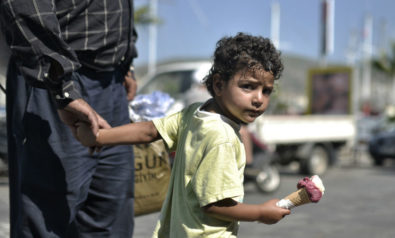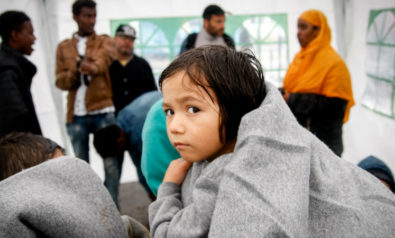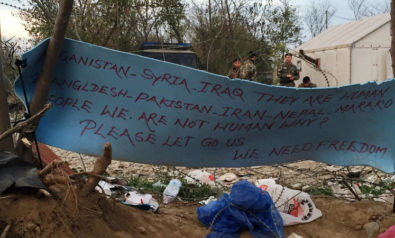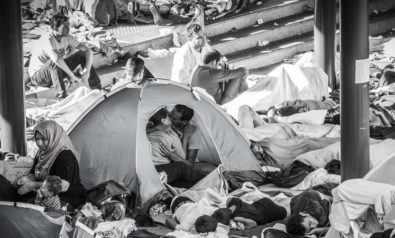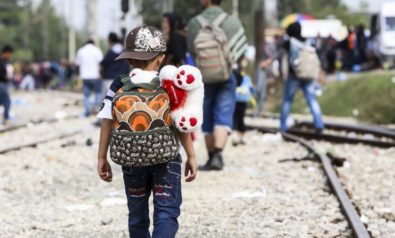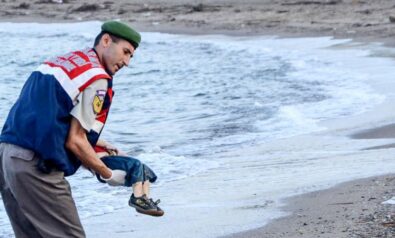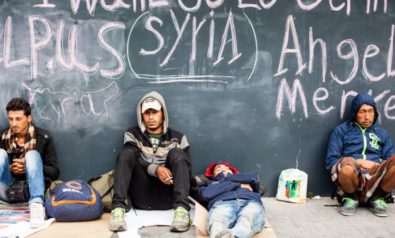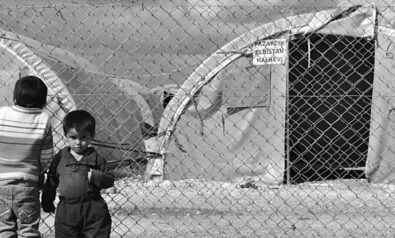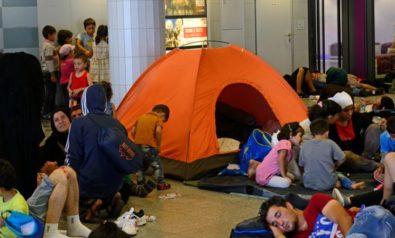Germany took in over a million refugees just a year ago. Today, it has the capacity but lacks the refugees.
In 2015, nearly 1.1 million refugees arrived in Germany. This immense wave of immigrants took German authorities by surprise. Since the capacities of the initial reception centers were not sufficient for this number of people, emergency camps had to be built. These camps were opened rapidly without any infrastructure or adequate equipment.
Inside the Camp
During my first few weeks as a social worker there, I had no office, no clear working agenda and no idea about how to deal with refugees. The camp was hosting 1,400 people from one day to the other. In this chaos, together with other employees, I tried to structure our work so we could provide help.
Since Germany has a federal structure, all refugees are distributed to different states (Bundesländer) according to the number of inhabitants. In every Bundesland, there are reception centers for asylum seekers.
Our camp, which is run by the Germany-based social welfare organization Arbeiter-Samariter-Bund (ASB), is one of these centers based in Lower-Saxony. In many cases, the refugees arrive here directly from the border. Before entering the house, they are greeted and registered. As a next step, everyone is examined for infectious diseases. Only after that are the people brought to their rooms. On the following day, they are registered as asylum seekers by the central registration agency of Lower-Saxony. In doing so, they receive a document that replaces their passport and enables them to receive benefits.
In the camp, we offer social and medical support, as well as language classes and child care. Every refugee has the right to an appointment with a social worker after registering as an asylum seeker.
Here, we discuss any problems or questions the refugees might have. We offer general information about the asylum process; crisis intervention; consultation for families and women; psychosocial consultation and support for psychologically strained or traumatized persons; addiction prevention; support with contacting other authorities; help and advice regarding questions about everyday life; and care for unattended, underage refugees. We also try to reduce ethnic, cultural, religious and interpersonal stress, and are involved in several networks and projects to improve the living situation of refugees in our camp.
When we began, none of these procedures were in place. It took some time to develop and implement them.
In the beginning, we tried to build a social service, but instead responded to people’s needs as best we could. This changed after one month. I finally had an office and started regular social consultation hours. Most people came to us with questions about how to reunite with their families or how long they would have to stay in the camp. Some people came to us with complaints, but most of them were more or less satisfied with their current situation and just wished that their asylum process would go faster.
Two months later, the first refugees were transferred from our emergency camp to different municipalities. In some cases, we had to intervene with the proceedings as German authorities started to separate families—a practice they soon stopped.
As time went on, more and more people started to get frustrated due to the long wait for a transfer. As our camp is run by ASB, one of the biggest challenges was to explain to refugees that only the authorities had the power to decide upon the date and destination of their transfer. So, the only thing we could do was let the authorities know about the refugees’ individual backgrounds and wishes.
Language Barrier
The biggest challenge in the day to day life together in the camp has been language barriers. Most of the refugees speak little or no English. We offer German classes but, for many, German is not an easy language to learn and it can take a long time to master it.
The most common languages in our camp are Arabic, Kurdish and Farsi. This is why translators are often the only way to communicate with asylum seekers. Communication, therefore, often takes place in a triangle. For this to work, it is necessary to trust the translators as they are the first to be contacted when refugees have a question or problem.
Translators play a key role for our work in the refugee camp. A specific problem related to this is the fact that we only have one female translator for Arabic, while a female translator for Farsi or Kurdish could not be found. Some women are clearly afraid to talk about their problems to a man and, therefore, never tell us what is going on.
Another issue is that some refugees—maybe more than we will ever know—are traumatized due to their experiences in their home country and/or during their escape. This leads to depression or abnormal behavior and makes it difficult to communicate with people. With more than a thousand people in the camp, it is impossible to identify all the cases of trauma because we have to rely on the information that refugees give us or the information we obtain through translators. When we started our work here, we could not offer help to traumatized asylum seekers. Later, we implemented consultation hours with a psychiatrist.
The help we can offer in the camp is not only limited in terms of capacity, but also in time. Asylum seekers have to stay a maximum of six months in a reception center. This means we can support them during that time, and in the municipalities they are later transferred to, they hopefully find someone else to help them.
At this point, the social support agencies, known as Sozialämter, are responsible for the refugees. After a transfer, asylum seekers sometimes have to live in camps even though they should be provided with their own flat or at least a shared one. This is due to the towns not having enough residential properties to guarantee housing for everyone.
This can lead to a worsening of the living situation, since after staying with us the refugees might have to live in a gym with even less privacy than in our center, which used to be a hospital and has lot of rooms with en suite bathrooms.
Due to this process, asylum seekers have to leave our camp even though we can provide them with far better living conditions than many municipalities.
This is not only due to the better housing situation, but also because we now have the structure and facilities we lacked in the beginning. We are ready for new refugees. We have 1,500 empty beds. We built a playground for children, and we know where to send people if they need psychological or judicial support. We have a network of volunteers; we work with the government office for youth and welfare, local doctors, midwifes, the employment agency and the church; and we cooperate with a local international educational institution.
Today, we have the means and infrastructure to take care of the needs of hundreds of people, but the number of refugees in our camp is very low.
Political Impact
The political situation is now completely different compared to fall 2015. Refugees are no longer welcome and thousands of people are waiting in Greece and elsewhere while we wait for work to do in the camp.
The German government is not willing to accept as many refugees as before. It is instead attempting to solve the problem by sending people waiting in Greece back to Turkey. Berlin seems to ignore the most important thing: Most refugees do not run flee just because of economic reasons. Who would leave everything behind just for that? They run away because they are desperate, because their lives are in danger, and because they hope for a better future or refuge in a place like Germany.
In a country that faces pressing problems like an ageing society, rural depopulation and a public pension system that is at risk of collapse, we should welcome the same number of people who fled war and hardship and arrived in Europe in 2015. This is a challenge, but we will grow with this challenge. We should heed Chancellor Angela Merkel’s words, and in the end we will benefit from it.
In 2015, Germany invested huge sums of money, time and energy to build the infrastructure to take care of asylum seekers. Today, thousands of refugees live in unbearable conditions outside European borders. People suffer at these borders while we are ready but unable to help them.
The views expressed in this article are the author’s own and do not necessarily reflect Fair Observer’s editorial policy.
Photo Credit: Joel Carillet
 We bring you perspectives from around the world. Help us to inform and educate. Your donation is tax-deductible. Join over 400 people to become a donor or you could choose to be a sponsor.
We bring you perspectives from around the world. Help us to inform and educate. Your donation is tax-deductible. Join over 400 people to become a donor or you could choose to be a sponsor.
Support Fair Observer
We rely on your support for our independence, diversity and quality.
For more than 10 years, Fair Observer has been free, fair and independent. No billionaire owns us, no advertisers control us. We are a reader-supported nonprofit. Unlike many other publications, we keep our content free for readers regardless of where they live or whether they can afford to pay. We have no paywalls and no ads.
In the post-truth era of fake news, echo chambers and filter bubbles, we publish a plurality of perspectives from around the world. Anyone can publish with us, but everyone goes through a rigorous editorial process. So, you get fact-checked, well-reasoned content instead of noise.
We publish 2,500+ voices from 90+ countries. We also conduct education and training programs
on subjects ranging from digital media and journalism to writing and critical thinking. This
doesn’t come cheap. Servers, editors, trainers and web developers cost
money.
Please consider supporting us on a regular basis as a recurring donor or a
sustaining member.
Will you support FO’s journalism?
We rely on your support for our independence, diversity and quality.




